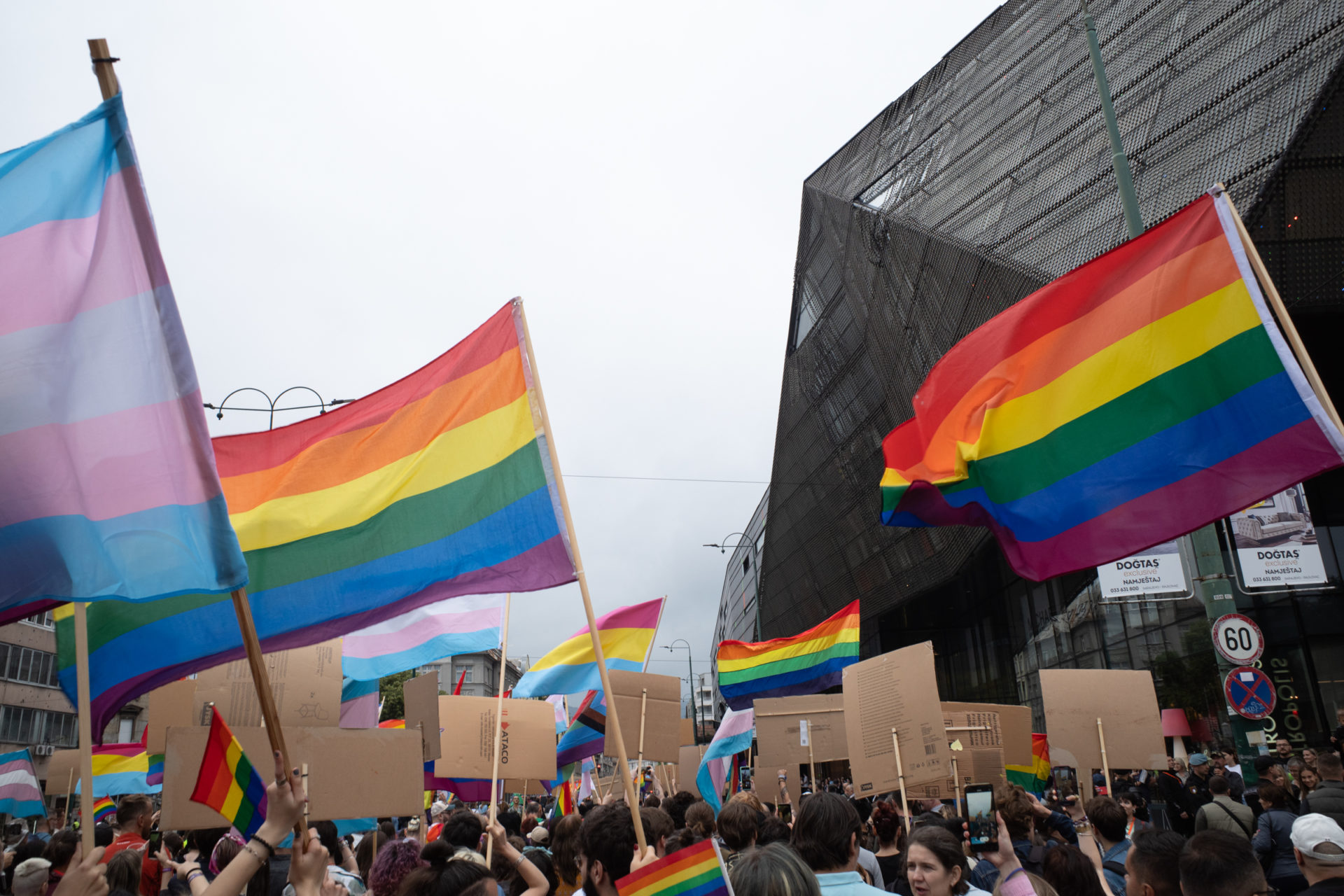
In Bosnian society, same-sex partnership is still taboo. It is discriminatory that same-sex unions are not recognized in the legal system of Bosnia and Herzegovina, which brings along a range of other problems, including inheritance rights, property management, partner maintenance, access to social and health benefits, pensions and tax benefits, as well as restrictions on visiting partners in case of serious illness.
Taking into account the conservative, religious and patriarchal elements present in family structures, it becomes apparent that the majority heterosexual population has a negative view of LGBTQI people and their demands. Such social factors further complicate the struggle for the recognition of rights and the acceptance of the LGBTQI community in Bosnia and Herzegovina.
According to a 2017 survey by the Sarajevo Open Center (SOC), as many as 80 percent of same-sex couples in Bosnia and Herzegovina want to formalise a life partnership, but their years-long relationships and the life they have built together are not recognized by state institutions.
Amil Brković, a lawyer and legal advisor from SOC, notes that Bosnia and Herzegovina has done very little in terms of recognizing the rights of same-sex couples. The legalization of the rights of same-sex partners is the responsibility of the entities and the autonomous Brčko District. To that end, the process of legal recognition has started only in the Federation of Bosnia and Herzegovina (FBiH), which began the process in October 2018.
“The first step entailed the Interdepartmental Group conducting a comprehensive analysis of legal regulations and their impact on same-sex couples, and drawing conclusions that would include recommendations on what needs to be done to improve the position of same-sex couples in the FBiH,” Brković explains.
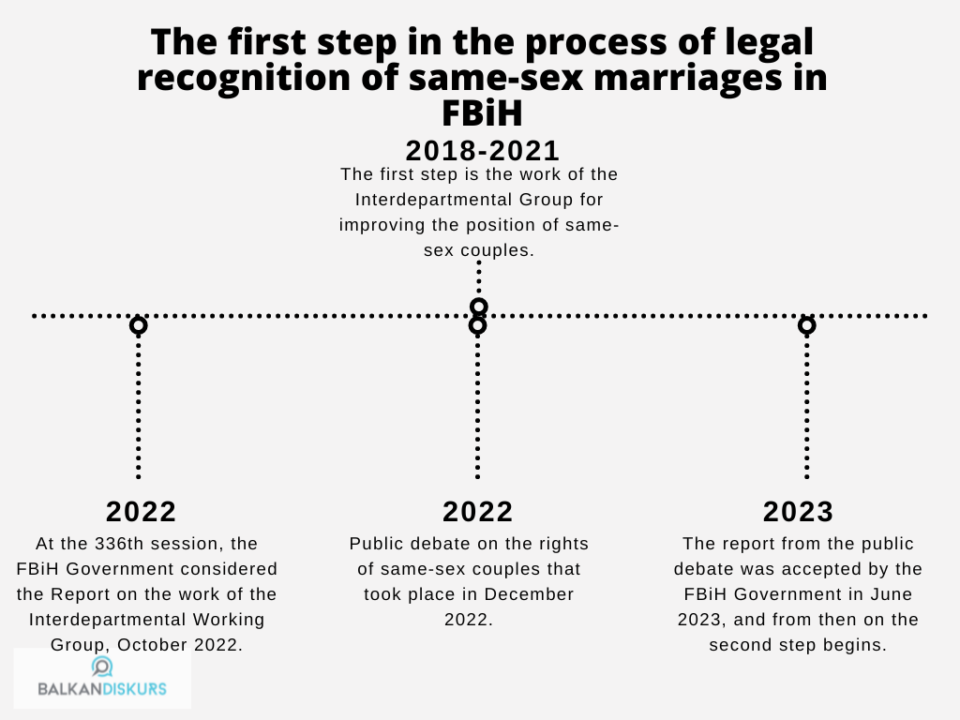
Brković adds that the second step of the process requires the relevant ministries, by order of the Federation of BiH (FBiH) Government, to appoint experts who would draft the law on same-sex cohabitation in the FBiH.
“From June 2023 to the moment of this interview, this second step has not even started because the Federal Ministry of Health is waiting to appoint its expert, while other ministries have done it on time,” emphasizes Brković.
No Recognition Means No Rights
Same-sex partnerships face many challenges and obstacles in Bosnia and Herzegovina. Long-term relationships of same-sex couples do not enjoy recognition or legal protection, which significantly limits their exercise of various rights that are available to heterosexual couples, regardless of whether they are married or not. Brković states that same-sex partners are not eligible for tax benefits or housing loans that married heterosexual couples can access. Likewise, if one same-sex partner dies, the other does not have the right to legally inherit the rights of the deceased partner. If one partner is hospitalized, the other does not have the right to visit as they will not be considered a family member.
The results of a 2023 survey of the problems and needs of Queer people in Bosnia and Herzegovina evaluated the responses of more than 250 respondents. The questions assessed the importance of legalizing different aspects of same-sex partnerships using a scale of one to five.
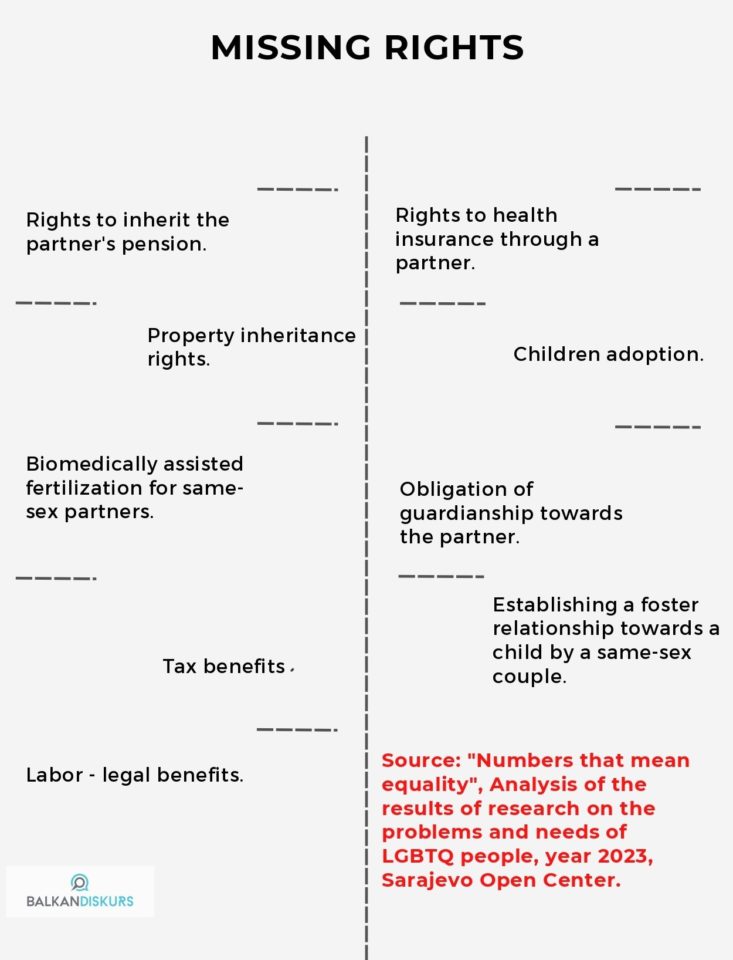
When it comes to public opinion, certain prejudices have remained throughout the last decade.
”In the survey of public opinion in the Western Balkans from 2015 and the repeated survey in 2023, over 66 percent of respondents from Bosnia and Herzegovina believed that LGBTQI people should not express their identity outside their four walls,” said Brković.

However, when respondents were presented with rights that are unavailable to same-sex partners, such as the right to health insurance, the right to visit a sick partner, tax benefits, inheritance of property and pensions, maintenance obligations, the right to custody of the partner’s biological child, the majority of respondents were in favor of them. According to Brković’s explanation, the respondents’ support decreased when it came to adopting children. He notes that proceedings are being conducted before the Constitutional Court of Bosnia and Herzegovina due to the fact that a person is unable to inherit their deceased partner’s estate from a same-sex relationship.
“These are real life stories of people who live in Bosnia and Herzegovina and to whom the state must provide equal rights,” says Brković.
In the absence of legal protection, same-sex couples try to find alternative options to be recognized by the law.
“There are situations in which same-sex couples from BiH have gone to neighboring countries to entera same-sex marriage and then, upon returning to BiH, have asked the domestic registry authorities to recognize a foreign public document on registered partnership in order to exercise their rights in BiH. All these cases have ended up before the courts and are awaiting decisions,” notes Brković.
As an alternative to seeking court recognition, some same-sex couples have decided to conclude a lifetime maintenance contract with a notary, and regulate the issue of inheritance through a will. According to Brković, these alternative directions are neither a stable nor a long-term solution for protecting the family life of same-sex couples in Bosnia and Herzegovina.
“It is necessary to legally and comprehensively regulate the legal position of persons in same-sex unions,” says Brković.
Legal protection of same-sex partners is traditionally opposed by right-wing political currents. There are also parties that support and advocate the rights of same-sex partners, such as the liberal Naša Stranka, but Brković adds that there are not many advocates on the political scene and that it will take a long time for the situation to change.
“Politicians generally come forward to speak about LGBTQI issues when the visibility of the community is increased. For example, before or after the Pride parades. In this way, political points are collected, all at the expense of one of the most marginalized communities in Bosnia and Herzegovina,” Brković states.
Anisa Pračić Šehić is a member of the organizing committee of the BH Pride Parade. For her, legal recognition of same-sex partnerships in Bosnia and Herzegovina at its entity level and Brčko District level would certainly make life easier for same-sex partners.
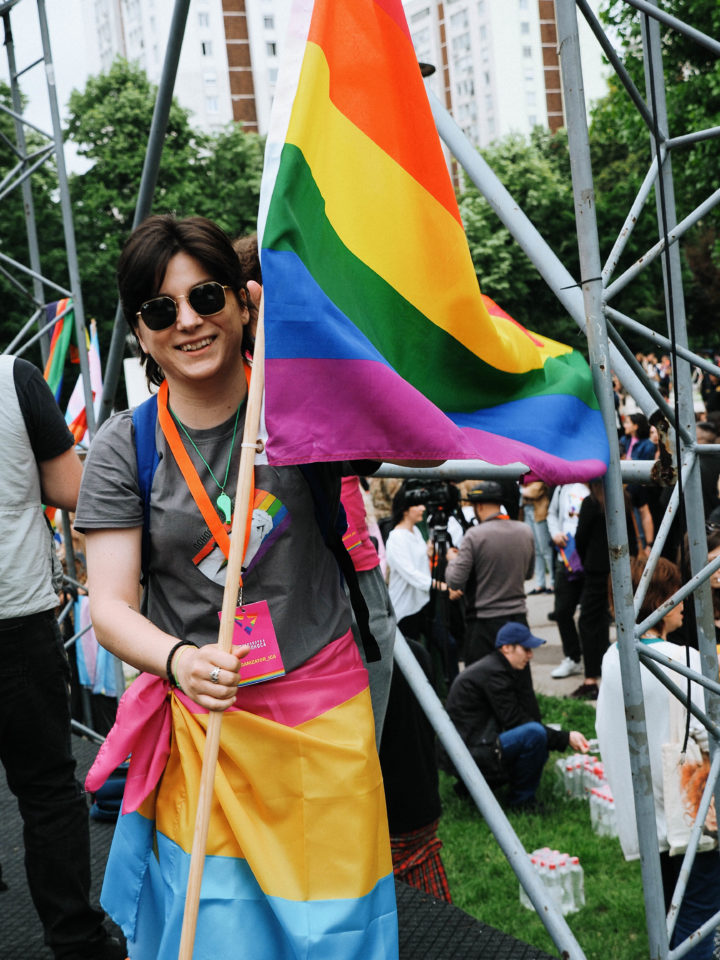
“The changes in the legislation would give a final confirmation of the visibility and demands of the LGBTQ+ community. The requirements are very clear, namely the right to a dignified life, protection of private and family life, prohibition of discrimination against LGBTQ+ persons and prevention of violence in all its forms,” said Pračić Šehić.
Rights Mean Mental Health
Legalizing same-sex relationships would also lead to a significant improvement in the mental health of the Queer community, as well as reducing their stigmatization.
“Certainly, the recognition of same-sex partnerships would give a sense of freedom. Social awareness should and must move in the direction of reducing homophobia, transphobia and biphobia,” believes Pračić Šehić. He also believes that the rate of violence would decrease, as competent institutions would be obliged to protect the LGBTQ+ community.
Admir Adilović, President of the Tuzla Open Center, says that Bosnian society has never been more ready for this change.
“We always ask ourselves whether it is the right time or not. There is no such thing as a right time. There is only this time that we are living right now. Therefore, now is the time for change and revolution. Whether our society is sufficiently sensitized or not is a separate topic. My position is that society must adapt because it is about basic rights and freedoms that must be available to all of us,” says Adilović.
Queer Life Partnerships in Neighboring Montenegro
In neighboring Montenegro, Miloš Knežević, Director of Queer Montenegro, says that the LGBTQ+ community in Montenegro only has the option of entering into a “life partnership” but not marriage. The Montenegrin constitution stipulates that marriage is only possible between a man and a woman. Miloš adds that great hope for the recognition of marriage has returned for social progress.
“All the necessary by-laws have still not been adopted, which would enable us to ensure that all LGBTQ+ people live in their full capacity under this Act. Laws related to the family and family ‘norms’ are the most stagnant. All this sends us a very clear message – the institutions of the system do not want to continue to deal with these obligations that are directly under their jurisdiction, so for years we have been going through direct institutional discrimination,” Knežević explains.
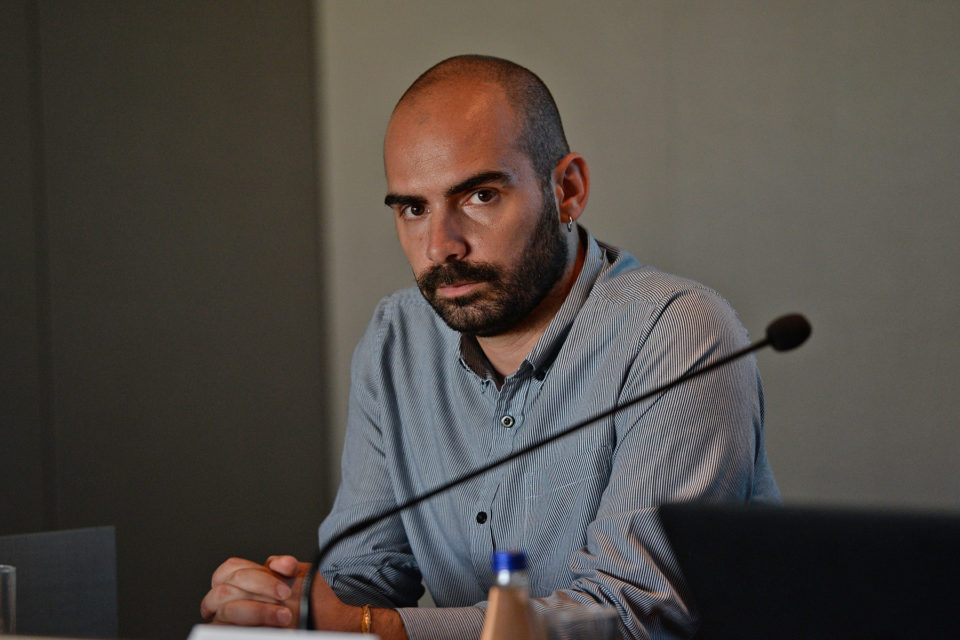
Knežević believes that Montenegrin society lives a certain disguised tolerance. In other words, thanks to activists and the civil sector, society has seemingly come to terms with the fact that LGBTQ+ people exist. However, rights such as freedom from discrimination remain contested. “In addition to institutional discrimination, attacks on LGBTQ+ activists and our premises where we work continue to occur, and hate speech on the Internet has never been greater,” emphasizes Knežević.
He adds that there are a small number of Queer couples in Montenegro who have taken advantage of the possibility of “life partnerships”. This, as Knežević says, is a clear indication of how accepted they are in society.
“Despite the fact that there are certain legal solutions, unfortunately LGBTQ+ people in Montenegro are still treated as second-class citizens – which reminds us every day that the fight for our rights must never stop,” says Knežević.
Jelena Đukić, a Montenegrin actress, points out that, after the legalization of same-sex life partnerships, the everyday life of Queer citizens of Montenegro has not changed dramatically. Although significant progress has been made, she notes that LGBTQI people still face challenges because they live in a traditionalist society that often rejects and denies basic human rights, such as freedom from discrimination.
“The adoption of the law on same-sex unions was supposed to put an end to discrimination based on sexual orientation. However, apart from the fact that the people I know after so many years of living together can register their union, like all citizens of our country, that they have equal rights of inheritance, joint property, pensions, etc. (although I would wait for the answer to the question of the overall application of this law ), I’m not sure how much anyone’s daily life has changed,” stated Đukić, emphasizing that the law has not reduced intolerance and violence towards members of the LGBTQ+ population in Montenegro.
Đukić stated that anti-Queer discrimination is growing stronger in Montenegro and abroad, especially in public discourse.
“Politicians, generally public figures and the media, maintain and very often support the fire that falls precisely on marginalized groups. So, unfortunately, I would say that, although our legal framework may be progressing, I am afraid of this feeling that we as people are regressing and hating more and more on various grounds,” concludes Đukić.






